In Fort St. John, a local society provides support to individuals affected by cancer diagnosis. The Fort St. John Cancer Support Circles Society (FSJCSS), founded by Brenda Baumeister, retired Northern Health (NH) nurse, and her good friend Lisa Behrens, helps those whose lives have been affected by a cancer diagnosis through monthly meetings, one-on-one visits, and a wig lending program. They also offer services to family members and friends who have been affected by a diagnosis.
We spoke with Brenda about her connections to health care and the drive to help those in need through the society.
What is your background in health care?
I am a retired nurse of 35 years. I worked at the Fort St. John Hospital, and I was involved in various types of nursing throughout my career.
What inspired you to start the FSJCSS, and how did it all come together?
I was inspired by my father's cancer diagnosis in 2006 to get involved with the Canadian Cancer Society (CCS), and I did a lot of fundraising and other duties with that organization. When they closed their doors in Fort St. John, my friend Lisa and I thought “there is more needed for our Northern communities.” We decided to create an event called the Carnival of Hope which was a local carnival that ran for 3 years and raised funds for the CCS. But we realized we also wanted to help individuals and support the people of Northern BC. Something like a peer group, to offer supports for those in need, where the people could come to us.
What supports do you offer?
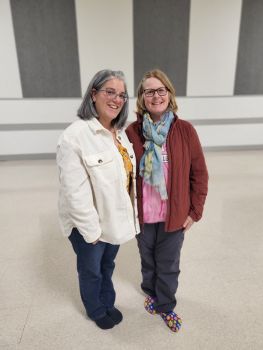
We started off offering once a month in-person meetings to those who wanted to meet other people in the same situation, and that went well! We would have workshops talking about nutrition, exercise, painting classes - anything to get people together in a communal area who had that common topic of cancer touching their lives. We also started offering one-on-one, in-person visits with individuals either at their homes, in coffee shops, or at the cancer clinic to provide personalized support. If they were traveling for treatment, I’d often do Zoom calls or phone calls. Anything to help.
On top of that, we decided to take on the wig lending program at the hospital. We now offer a lending system for wigs. You can come in, borrow a wig for as long as you want, and exchange or bring it back as you see fit. And with that we provide stands, shampoos, conditioners, and other care items for the wigs. We have also expanded the wig program to other people, not just cancer patients, because hair loss is huge. Now we have clients with alopecia that come to us and we can help them out as well.
You have really focused on offering full, wrap-around supports for those who need it.
We make sure to tell everyone we are not computers, we are real people, which means they can talk to us about their needs. A big piece of that is assisting patients in navigating asking their care team questions. When someone is diagnosed with cancer they are handed a huge amount of paperwork. How can you even bare to look at all that, or deal with the information given to you by your care providers? What about the financial piece? It costs a lot of money to travel for treatment, which may be a necessity. We can help navigate that as well. So many people are still trying to do all this on their own, and it's important to have another person, not just the care team, or support network, that they can rely on to help. We can help get the information needed if they are not able or willing to do it themselves. We like to say we cover mental, physical, and emotional support.
FSJ Hospital Foundation hosts an awesome cancer support day, Bluey Days, are you part of that as well?
The foundation has always been incredibly supportive of our efforts and our growth. If someone comes in asking about us, the foundation will always talk about us, and they hand out our brochures on our behalf. On Bluey Days, we have a table with info and brochures, and we connect with the crowds that come to the event. Last year we had five people stop and inquire, so we are happy for the opportunity to be there.
Do you know how many people you have helped since you started?
It's been a gradual process. Starting back in2016, we would see 12 or 13 people come to our monthly meetings. Since COVID hit, those numbers have shrunk a little bit. Our one-on-one meetings have gone up and we have been visiting people in the hospital. Currently we have 77 people on our mailing list, and an additional 14 people out with wig rentals. We have helped more than 30 people with full services. We always say if we can help one person out of 20 interested people, that is the bottom line. If you can help one person, you are making a difference. We had a woman reach out to us recently who had been thinking about it for three years before she finally came to us. We were so happy she knew we were here.
What might make someone wait three years to reach out for support?
Sometimes I think if they’re not inquiring, then maybe they don’t know about us, when really they do but it just takes time for people's minds to wrap around the fact they might need help. When someone gets a diagnosis, it can affect everyone around them. Often the ones who are not reaching out are the caregivers or family members. It’s harder to connect with them. Meanwhile, the clients are so overwhelmed they don’t think they need any support. They’re just done. So, they don’t come to us.
Are you trying to expand your reach?
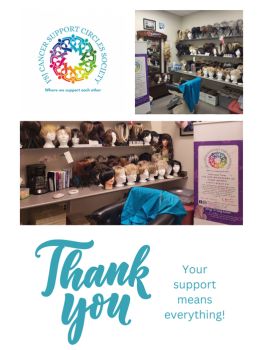
We are trying to expand our services to help those across the Northeast region. We have signs up, brochures out, we have talked to local first Nations communities, hospitals, pediatrics hospitals, and other health authorities. We participate in the local Bluey Days, setting up tables with information about out services to engage with the community. I have connected with the Fort St. John City Council and other local organizations to raise awareness about our support programs. We are trying to get our name out there as much as we can.
What is the best way to connect with the society?
Anyone can show up at the meetings, on the second Wednesday of every month, 6:30 pm, at Northern Lights College. Additionally you can email us at FSJCSC@Gmail.com. Our website isn’t quite ready yet, but we’re working on it to be ready soon! Contact any way you want to. We are here, in whatever capacity you need us.
And for those who are wanting to help through volunteering their time with us, please reach out. We have lots of work to do. We want everyone to know there are other people, outside of a medical sphere who are here to help. Please reach out. We are here if you need us.
Thank you to Brenda Baumeister and her team, for the amazing effort the society has put forward helping those in need. If you or someone you know has been affected by a recent cancer diagnosis, reach out to the FSJ Cancer Support Circles Society, or drop into one of their monthly sessions.

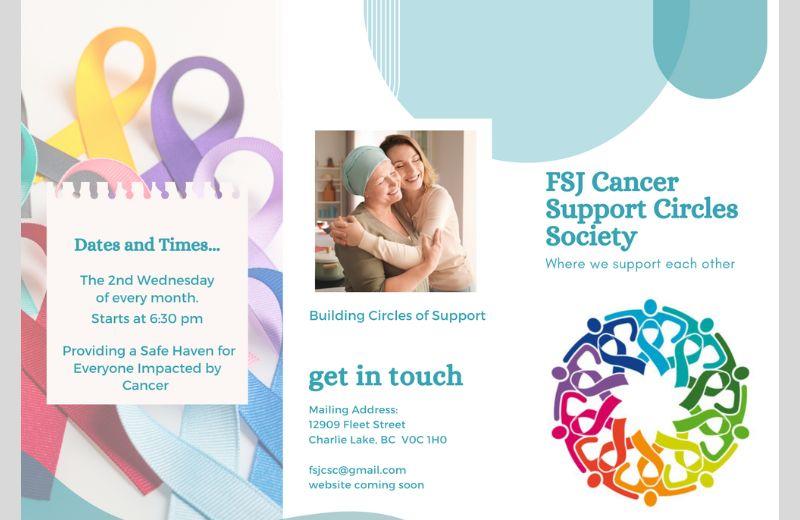









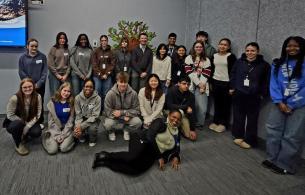
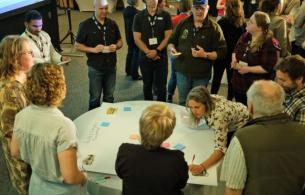

Comments